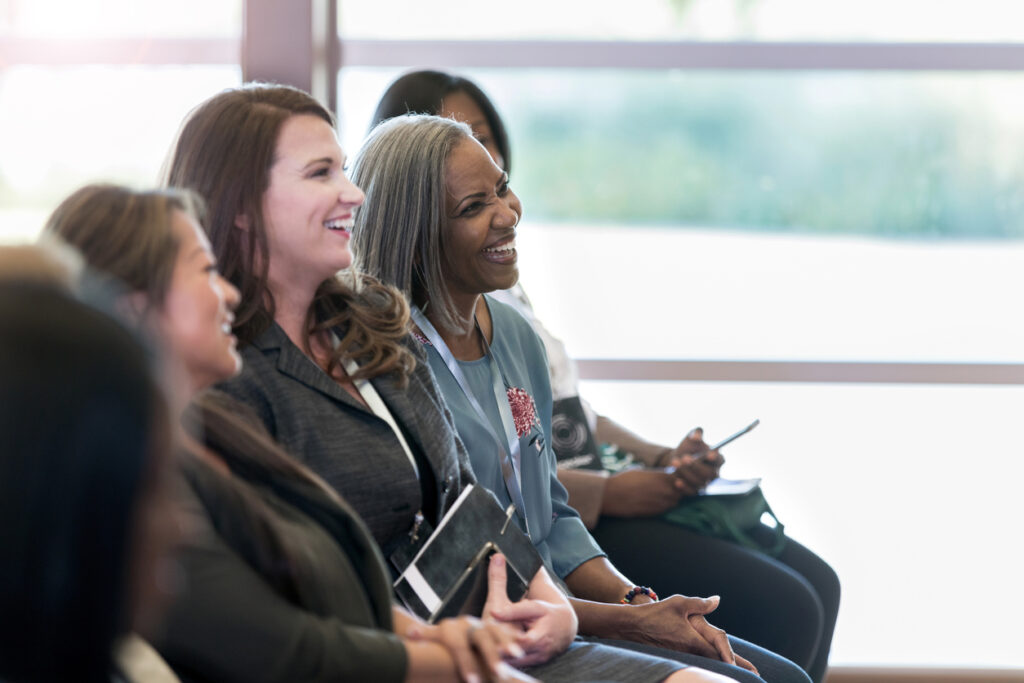Do women need their own leadership programmes?
It’s a hotly debated topic that provokes a range of opinions. However there is certainly something to be said for the effects of more women in leadership positions. In fact, according to a Morgan Stanley report:
"More gender diversity, particularly in corporate settings, can translate to increased productivity, greater innovation, better products, better decision-making, and higher employee retention and satisfaction."
Despite the observed benefits, however, company leadership around the world remains unbalanced, with women accounting for less than a quarter of management positions globally. The disparity is even greater when it comes to higher-level management positions.
24/7 Wall St. analysed data compiled by the research group LedBetter and discovered that of the 234 companies that own almost 2,000 of the world's most recognised consumer brands only 14 of the companies had a female CEO, while nine of them had no women at all serving in executive positions or on their boards.
Whilst there is a huge amount of work to do in organisations to achieve equality of outcome and opportunity, supporting leaders who identify as women to feel confident is of the utmost importance.
We now have an emergence of a new style of female leadership in the likes of Jacinda Ardern, Michelle Obama and Angela Merkel. A style that says you can be strong, compassionate and grounded at the same time.
Why is it easier for some women and not others?
Some believe that leadership roles should be offered on merit only and gender shouldn’t come into it. This topic won’t be resolved in one article but it can stimulate food for thought amongst our L&D community.
Having worked in both large corporate organisations and smaller start-ups throughout my own 16 year career as a female executive I have never received any dedicated female leadership development and all the programmes I have been involved with (both as a delegate and facilitator) have been fairly healthy balanced in terms of gender. There have been outspoken men and women on these programmes as well as introverted individuals of both genders.
However, when it comes to the three board tables I have sat on in my career I have been the minority by a mile or two. Having been in the learning profession for many years I am self-aware of my own personality traits. I have also been qualified in several tools, which have all given similar read backs in terms of my style: Extroverted, Thinker, Assertive, Director etc. Indeed when I changed my name for marriage in 2001 to Carolyn ‘Blunt’ my friends and family sniggered at the suitability.
But this got me thinking, is this why I forged an executive career with what felt like relative ease and no specifically female targeted development? Do women who display the characteristics often associated with male leaders find the rise to the top easier than those who don’t naturally have those traits?
And, of course, there is an opposite benefit to any personality aspect. Where I was strong and confident I often lacked sensitivity, diplomacy and tact. These are things I have had to work hard on (and still do) to this very day.
I did, however, notice that when I facilitated assertiveness training 80% of my delegate cohorts were female. They had attended because they often wished they could speak up more in meetings, felt taken advantage of in project teams and unable to say ‘no’ to demands put upon them in the workplace.
A new style of leadership is on the block
We now have an emergence of a new style of female leadership in the likes of Jacinda Ardern, Michelle Obama and Angela Merkel. A style that says you can be strong, compassionate and grounded at the same time and I think our leadership programmes going forward need to reflect this.
A recent poll found that Ardern is New Zealand’s most popular Prime Minister in 100 years. Almost 92 per cent of respondents say they support the measures she has implemented. And she has juggled her role whilst also introducing her baby daughter and shoots down any questioning about whether women should have to choose between career and families.
However, in practice, and having had two children during my career, it can also be unrealistic to expect women to be able to excel simultaneously in all areas of work and family.
The homeworking caused by the global pandemic of 2020 has gone some way to reducing the demands of business travel. But it has simultaneously created new challenges with the closing of schools and childcare which has left working women torn (one small win has been the new level of understanding when children interrupt conference calls).
Having a women-only programme creates a safe environment for those who are keen to grow in confidence or who are naturally more introverted, but who will still make fantastic leaders.
What do the latest statistics reveal?
In 2020, only 5% of FTSE 100 CEOs are women, which means 95% are male. The FTSE 250 is even further behind, with only five women CEOs. We still have a long way to go to get even close to a balance that reflects society where there are 100 girls born for every 107 boys. The UK government is also backing the shift and in 2019 stated that half of all FTSE 100 executive level appointments in 2020 must be women in order to achieve a target of 33% female representation across boards in the index.
33% is a magic number as research by The Pipeline also found that FTSE companies who have more than 33 per cent female executives have a net profit margin over ten times greater than those companies with no women at this level. This equates to the UK economy and shareholders losing out on an additional £47 billion in pre-tax profit.
Diversity is not just the right thing to do but it makes sound commercial sense as well.
How women’s networks tackle unhealthy thought patterns
I believe that having a women-only programme creates a safe environment for those who are keen to grow in confidence or who are naturally more introverted, but who will still make fantastic leaders. Being amongst a group of welcoming peers from outside your organisation can provide a fresh support network, new perspectives and plenty of encouragement.
Two of the biggest fallacies women leaders often experience though are the ‘imposter syndrome’ – believing they shouldn’t be where they are and will get ‘found out’ and ‘sideways syndrome’ – comparing themselves to others unfavourably and making assumptions about what other women appear to be doing so beautifully, whilst not knowing the real struggles behind the scenes.
Talking more openly about these difficulties and finding timely support and strategies through a women’s network will not only benefit women themselves but also the organisation for which they work.
In addition to the business learning elements, a large focus in our long-term development programme for women is in hearing the stories of other women, learning about what they have done to get where they are, the setbacks they have faced and the way they overcame them. Recognising ‘imposter syndrome’ and ‘sideways syndrome’ and being able to stop these unhealthy thought patterns is critical.
I am now delighted to see the number of conversations about Women In leadership increasing, more focused networks, events and learning opportunities being created.












One Response
Hear hear.
Hear hear.
The women-only programmes we’ve run have always been universally appreciated.
Blokes like me need to get out of the way – except to encourage them to happen. 🙂
Thanks